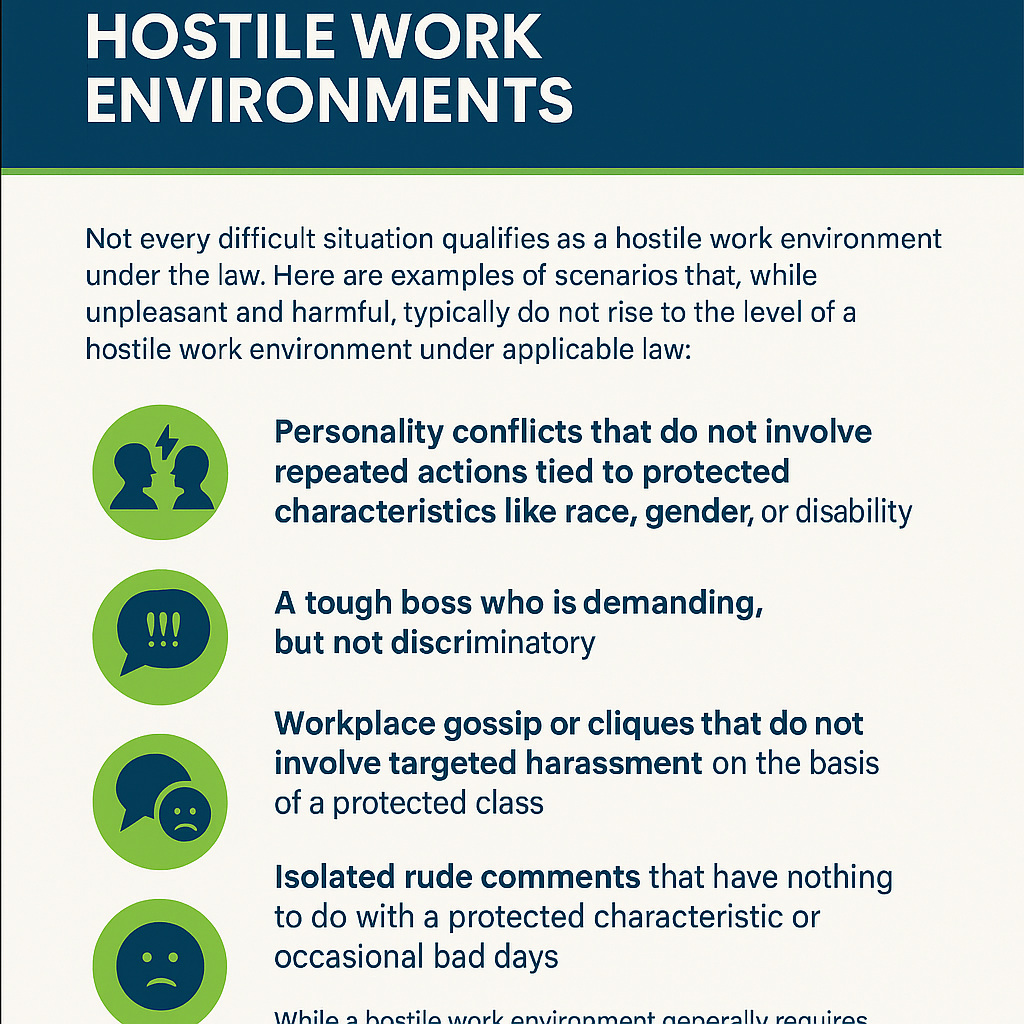A hostile work environment occurs when an employee experiences harassment or discrimination based on a legally protected characteristic that is severe or pervasive enough to create an intimidating and abusive workplace. To be legally actionable, hostile or unwelcome behavior must occur because of the employee’s protected characteristics. Protected characteristics, classes, and categories under federal and State laws include sex (including gender identity and sexual orientation), race, color, religion, national origin, age, disability, and pregnancy. The behavior must also be so severe or pervasive as to interfere with the employee’s ability to perform their job, or to create an environment that a reasonable person would consider hostile. If you’ve experienced a hostile workplace, you might feel embarrassed or humiliated. It can be challenging to know what to do or who to trust.
The Noble Law, a women-owned practice, is a recognized leader in employment law with offices in North Carolina and South Carolina. We work to deliver outcomes with integrity and empathy for the client’s journey. If you believe you are experiencing harassment or a hostile work environment because of your protected class, we believe you and want to hear your story. We are your trusted counsel for workplace disputes.
What Constitutes a Hostile Work Environment?
In a hostile work environment, employees may experience:
- Discriminatory Remarks or Actions. Comments or behavior targeting someone’s race, religion, gender, age, sexual orientation, or other protected traits.
- Sexual Harassment. Unwelcome advances, inappropriate touching, sexually explicit jokes or comments, displaying sexually inappropriate material or content, or promising benefits (promotion, raise, etc.) in exchange for sexual favors.
- Bullying or Intimidation. Aggressive behavior, threats, or actions intended to demean or embarrass a colleague.
- Verbal Abuse. Yelling, insulting, or demeaning language directed at an employee.
- Spreading Gossip or Rumors. Sharing harmful or untrue information about coworkers to damage their reputation.
- Sabotaging Work. Intentionally hindering an employee’s ability to complete tasks, such as withholding information or resources.
- Unreasonable Work Expectations or Threats. Assigning impossible tasks or threatening job loss to create stress and fear.
These behaviors can make employees feel unsafe, undervalued, and unable to perform their jobs effectively. When frequent or severe, it can erode trust, morale, and the overall sense of security in your workplace, making it difficult to thrive professionally.
If you are punished for submitting a complaint or reporting harassment or a hostile workplace, you may also have a retaliation claim.
Clarifying Misconceptions About Hostile Work Environments
Not every difficult situation qualifies as a hostile work environment under the law. Here are examples of scenarios that, while unpleasant and harmful, typically do not rise to the level of a hostile work environment under applicable law:
- Personality conflicts that do not involve repeated actions tied to protected characteristics like race, gender, or disability.
- A tough boss who is demanding, but not discriminatory.
- Workplace gossip or cliques that do not involve targeted harassment on the basis of a protected class.
- Isolated rude comments that have nothing to do with a protected characteristic or occasional bad days.
While a hostile work environment generally requires pervasive (or repetitive) behavior, certain extreme cases of offensive conduct can still meet the criteria for such conditions, even if they occur just once.
For example, a single incident of sexual assault, a highly inappropriate sexual comment, or overtly racist or discriminatory behavior can be so severe that it significantly alters the employee’s conditions of employment or makes them feel unsafe returning to work. This type of conduct may be actionable under workplace laws, including Title VII of the Civil Rights Act of 1964 and other federal or state anti-discrimination laws.
Get Help with The Noble Law
If you believe you are experiencing a hostile work environment on the basis of a legally-protected characteristic, seek advice and counsel from an experienced attorney as soon as possible.
At The Noble Law, we carefully investigate incidents of workplace harassment. We are a recognized leader in employment law that is leveling the field for employees in North Carolina and South Carolina. Our success is measured by delivering positive impacts for our clients and serving as a catalyst for changes in employment law and society. Contact us today to schedule a confidential consultation with an experienced employment attorney.
About The Noble Law Firm
The Noble Law is a women-owned employment law firm with offices in North Carolina and South Carolina, founded by Laura Noble in 2009. Specializing in wrongful termination, workplace harassment, workplace retaliation, workplace mediation, and neutral third-party investigations, the firm is committed to leveling the playing field for employees. Their focus is on delivering positive outcomes with empathy and integrity, while also driving societal change in employment law.
The firm emphasizes diversity, collaboration, and innovation, fostering a balanced work environment that values the personal lives of its staff. With a strong commitment to technology and efficiency, The Noble Law provides personalized attention to a select group of clients, handling cases involving harassment, discrimination, retaliation, and more. The team’s extensive litigation experience allows them to deliver thorough and assertive representation.


